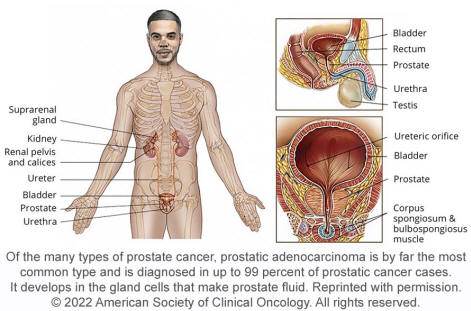|
|
|
|
|
|
 |
|
|
|
| |
Former
President
Joe
Biden
Diagnosed
with
Aggressive,
Metastatic
Prostate
Cancer
Dr.
Edgar
Williams
-
Medical
News
Beat
Tell Us
USA News
Network
Diagnosis
and
Details
WILMINGTON,
DEL -
Former
U.S.
President
Joe
Biden,
82, has
been
diagnosed
with an
aggressive
form of
prostate
cancer
that has
metastasized
to his
bones,
according
to a
statement
from his
office
released
Sunday.
The
diagnosis
followed
an
evaluation
for
worsening
urinary
symptoms
and the
discovery
of a
prostate
nodule
last
week. On
Friday,
Biden
received
confirmation
of
prostate
cancer
with a
Gleason
score of
9 (Grade
Group
5),
indicating
one of
the most
aggressive
forms of
the
disease.
Medical
Context
and
Prognosis
A
Gleason
score of
9
signifies
highly
abnormal
cancer
cells
and a
strong
likelihood
for
rapid
growth
and
spread.
When
prostate
cancer
spreads
beyond
the
prostate-especially
to the
bones-it
is
classified
as stage
4, the
most
advanced
stage.
While
metastatic
prostate
cancer
is
generally
not
considered
curable,
it can
often be
managed,
particularly
if the
cancer
is
hormone-sensitive,
as in
Bidenís
case.
Hormone-sensitive
cancers
may
respond
well to
treatments
that
deprive
tumors
of the
hormones
they
need to
grow.
Survival
rates
for
prostate
cancer
that has
spread
to the
bones
are
significantly
lower
than for
localized
disease.
Studies
indicate
a median
survival
of just
over 21
months
for
patients
with
bone
metastases,
with
about
33%
surviving
five
years
after
diagnosis.
However,
individual
outcomes
vary
based on
age,
overall
health,
and
response
to
treatment.
Treatment
and Next
Steps
Biden
and his
family
are
currently
reviewing
treatment
options
with his
medical
team.
Management
of
metastatic,
hormone-sensitive
prostate
cancer
typically
includes
hormone
therapy
and may
involve
chemotherapy
or other
targeted
treatments.
Advances
in
treatment
over the
past
decade
have
improved
the
outlook
for many
men with
advanced
prostate
cancer,
allowing
some to
live
five to
ten
years or
more
following
diagnosis.
Public
and
Political
Response
The
announcement
drew
bipartisan
expressions
of
support,
including
from
former
President
Donald
Trump,
who
wished
Biden a
swift
recovery.
Vice
President
Kamala
Harris
and
other
political
leaders
highlighted
Bidenís
resilience
and
expressed
confidence
in his
ability
to face
this
challenge.
Background
and
Broader
Impact
Bidenís
health
has been
a
subject
of
public
scrutiny,
especially
given
his age
and
recent
history
as the
oldest
person
to serve
as U.S.
president.
Since
leaving
office,
he has
kept a
relatively
low
profile,
making
occasional
public
appearances
and
defending
his
record
and
cognitive
health
in
interviews.
This
diagnosis
follows
Bidenís
personal
history
with
cancer
advocacy,
notably
his
revival
of the
Cancer
Moonshot
initiative
in 2022,
which
aims to
reduce
cancer
death
rates by
at least
50% over
25
years.
|
|
|
|
|
|
|
|
|